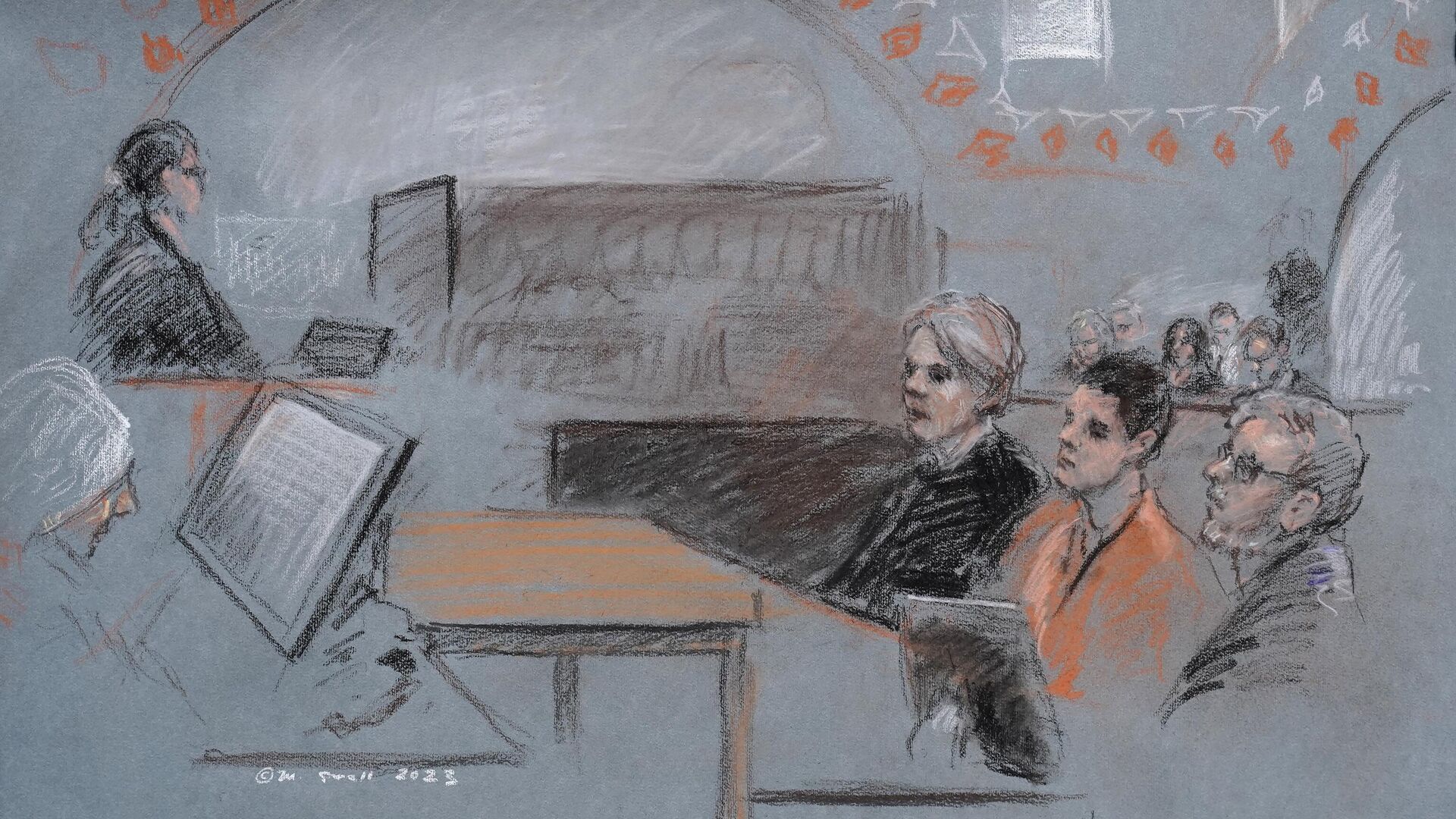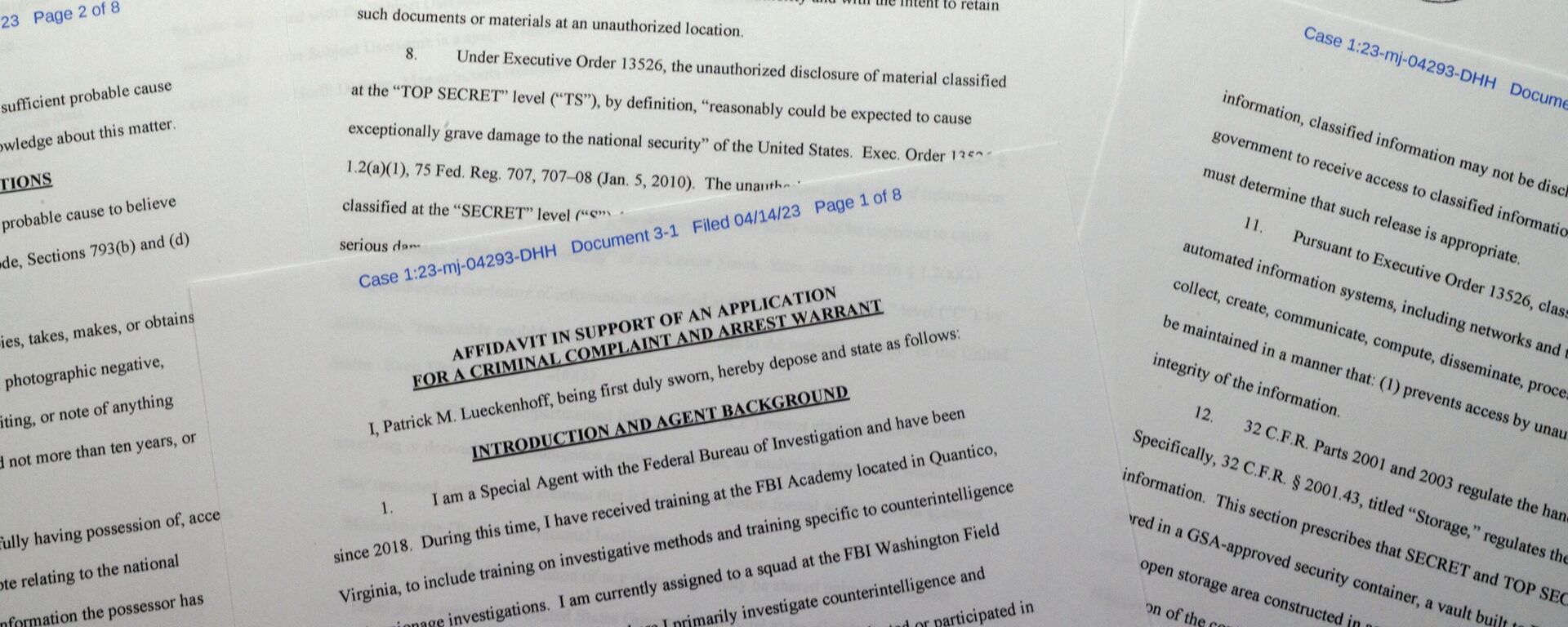https://sputnikglobe.com/20231215/inherent-problem-pentagon-cant-weed-out-leakers-like-teixeira-due-to-recruitment-targets-1115611188.html
‘Inherent Problem’: Pentagon Can’t Weed Out Leakers Like Teixeira Due to Recruitment Targets
‘Inherent Problem’: Pentagon Can’t Weed Out Leakers Like Teixeira Due to Recruitment Targets
Sputnik International
Chronic recruitment problems in the US military contributed to the ability of a low-level service member to leak classified information - problems so deep that the Pentagon and FBI have obscured them instead of solving them.
2023-12-15T18:58+0000
2023-12-15T18:58+0000
2023-12-15T18:58+0000
jack teixeira
coleen rowley
fbi
us air force
pentagon
leak
recruitment
americas
https://cdn1.img.sputnikglobe.com/img/07e7/04/1b/1109899023_0:251:3072:1979_1920x0_80_0_0_16138f01d6240618688f4e70c85b2c45.jpg
Earlier this week, the US Air Force said it had disciplined 15 people in connection with the leaking of classified information onto a Discord server. In April, the FBI arrested Airman First Class Teixeira and charged him with the leaks, which he allegedly shared on the server in an attempt to impress his friends and not to supply the information to a foreign power.Those disciplined this week ranged in rank from sergeant to colonel, who were held responsible for command failures, lax oversight and a lack of robust security clearance investigations. An internal USAF probe found that people in Teixeira's unit, the 102nd Intelligence Wing at Otis Air National Guard Base in Massachusetts, "failed to take proper action after becoming aware of his intelligence-seeking activities."Former senior FBI agent and renowned whistleblower Coleen Rowley told Sputnik that while the USAF punished those responsible for the leak, it had done nothing to address the underlying causes of such leaks, including the type of recruits the Pentagon seeks out and the communications systems that regularly put low-level service members in contact with highly secretive information.“And the 15 - I don't think they got severe punishment. I don't think, for instance, like the commander got his pension taken away or anything like that. They have shut down this one, Otis, I think it was called the one Air Force base where he worked as the intelligence, part of that was shut down for a while. But how many other places in the United States have the exact same problem, the same dynamic?”Rowley said that in its coverage of the leaks, the media was “telling the truth,” but noted it had also not “dug deeply” into the facts revealed in the leaks.“These documents, there’s hundreds of them. A lot of it pertains to the Ukraine war and casualties, whether it's Ukrainian casualties, or Russian casualties - actually, even operational plans being conducted in Ukraine. And the spying information that the United States has, not only on Russia, but also on Egypt and China, - of course, Egypt being an ally, so the spying operations that the US conducts on even allies,” she said.Rowley explained that Teixeira having access to such information wasn’t unusual: it’s become routine for low-ranking service members, many of whom are barely adults, to handle secret communications between higher-ups, they’re not 60-year-old generals.“I think there's a broader problem here. And the broader problem is the all-volunteer force is very desperate and they are not getting their [recruitment] numbers. They've had to relax their standards across the board, even on weight and physical fitness and criminal background. In this case, Teixeira did have a criminal record from high school for some kind of violent threat that they kind of glossed over. Well, why are they doing that? It's because they can't recruit enough people,” she explained.Indeed, the recruitment chiefs for the US military’s five service branches told Congress last week that many of them had failed to meet their recruitment goals, with the US Army missing 110,000 active duty and reserve soldiers.“Teixeira’s probably not the only one who was trying to impress other people on these on these boards. You know where it's all highly militarized and they're like little boys playing war games and whatever and seeing themselves - I'll bet you anything he's not the only one in the military involved in this. In fact, I think there is a there's many more. And that is an inherent problem because the military cannot weed those people out and they can't profile. You know, they would like you to believe that they can profile an insider threat, Well, no, they can't, because this is all they have working. These are the people that they have recruited.”“Teixeira was impressing the teenage people, but none of them realized any significance, apparently none of them tried to sell it. If they would have tried to, they could have maybe tried to sell it to Russia or something and make money,” Rowley noted.“And, you know, the thing is to figure out: how can you do this? Well, they claim that they can profile insider threats, but that's next to impossible, because you don't know how many people match the profile. Here's the thing that's not ever said: yeah, Teixeira may have matched the profile, but he might have been 1% and there might be another 99% of people who were not doing anything wrong and who also matched the profile. When you access something, maybe out of idle curiosity, can you imagine the number of people who are just reading something that happens to come across their screen or whatever? Because this apparently is what the investigators said should have tipped them off: that he was too interested in pieces of information that his job did not really require. So they should have been tipped off. But I can imagine that's going on a lot, because people are curious and they will access things, and then superiors and colleagues will say, well, I've done that too, so I don't want to turn him in because all of us are doing it.”
https://sputnikglobe.com/20230718/alleged-pentagon-leaker-asks-court-to-lift-pretrial-detention-cites-trump-release-1111956332.html
https://sputnikglobe.com/20231211/pentagon-recruitment-struggling-as-iraq-afghan-war-vets-warn-youth-against-service-1115524557.html
americas
Sputnik International
feedback@sputniknews.com
+74956456601
MIA „Rossiya Segodnya“
2023
News
en_EN
Sputnik International
feedback@sputniknews.com
+74956456601
MIA „Rossiya Segodnya“
Sputnik International
feedback@sputniknews.com
+74956456601
MIA „Rossiya Segodnya“
teixeira, discord leak, secret files leaked,
teixeira, discord leak, secret files leaked,
‘Inherent Problem’: Pentagon Can’t Weed Out Leakers Like Teixeira Due to Recruitment Targets
Chronic recruitment problems in the US military contributed to the ability of a low-level service member to leak classified information - problems so deep that the Pentagon and FBI have obscured them, telling the public they have new processes in place that cannot possibly identify leakers accurately.
Earlier this week, the US Air Force said it had disciplined 15 people in connection with the leaking of classified information onto a Discord server. In April, the FBI arrested
Airman First Class Teixeira and charged him with the leaks, which he allegedly shared on the server in an attempt to impress his friends and not to supply the information to a foreign power.
Those disciplined this week ranged in rank from sergeant to colonel, who were held responsible for command failures, lax oversight and a lack of robust security clearance investigations. An internal USAF probe found that people in Teixeira's unit, the 102nd Intelligence Wing at Otis Air National Guard Base in Massachusetts, "failed to take proper action after becoming aware of his intelligence-seeking activities."
Former senior FBI agent and renowned whistleblower Coleen Rowley told
Sputnik that while the USAF punished those responsible for the leak, it had done nothing to address the underlying causes of such leaks, including the type of recruits the Pentagon seeks out and the communications systems that regularly put low-level service members in contact with highly secretive information.
“It does not look like they've gotten to the root of the problem, which would mean a lot of tracking of every single thing. They maybe would have to apply algorithms or something to it - and I think that to some extent, the FBI tried to do this after Robert Hanssen. Then, they did put mechanisms on the computer systems so that they could tell who was accessing things so that if it fell outside the purview of what their actual job was, then they could say, ‘oh, it's suspicious’. And again, apparently two or three colleagues, or even a superior, saw him accessing, but like I said, I think they just kind of like, ‘well, I can't, you know, I've done that before, and we don't want to - we're all part of the team, and if I punish him or whatever or raise it, then that might hurt the morale of other people doing good work.’ So you can see the reasons for this,” she said.
“And the 15 - I don't think they got severe punishment. I don't think, for instance, like the commander got his pension taken away or anything like that. They have shut down this one, Otis, I think it was called the one Air Force base where he worked as the intelligence, part of that was shut down for a while. But how many other places in the United States have the exact same problem, the same dynamic?”
Rowley said that in its coverage of the leaks, the media was “telling the truth,” but noted it had also not “dug deeply” into the facts revealed in the leaks.
“These documents, there’s hundreds of them. A lot of it pertains to the Ukraine war and casualties, whether it's Ukrainian casualties, or Russian casualties - actually, even operational plans being conducted in Ukraine. And the spying information that the United States has, not only on Russia, but also on Egypt and China, - of course, Egypt being an ally, so the spying operations that the US conducts on even allies,” she said.
“Now, here's the thing. The media, the mainstream media, I think just recently Frontline on public television did a special and The Washington Post has run stories on this. But, you know, I hadn't seen a whole lot about it other than Teixeira’s arrest. You know, they did cover that, but, you know, they did not cover - and it goes back to what you said, you know, they see themselves as an arm of the United States [government]. They haven't really dug deeply into the actual leaks themselves. Not too much. I was actually surprised to see how broad those links were, and frankly, in some of the cases, at least, they were quite damaging and at least very embarrassing to the United States.”
Rowley explained that Teixeira having access to such information wasn’t unusual: it’s become routine for low-ranking service members, many of whom are barely adults, to handle secret communications between higher-ups, they’re not 60-year-old generals.
“I think there's a broader problem here. And the broader problem is the all-volunteer force is very desperate and they are not getting their [recruitment] numbers. They've had to relax their standards across the board, even on weight and physical fitness and criminal background. In this case, Teixeira did have a criminal record from high school for some kind of violent threat that they kind of glossed over. Well, why are they doing that? It's because they can't recruit enough people,” she explained.
Indeed, the recruitment chiefs for the US military’s five service branches
told Congress last week that many of them had failed to meet their recruitment goals, with the US Army missing 110,000 active duty and reserve soldiers.
“They've relied for decades on exactly what Teixeira was: he was a violent video gamer who got interested in the military based on violent video games. And so a lot of the recruits, this is why they've used these, they used to actually set them up and try to recruit, you know, 10-, 12-year olds to be playing violent video games because it served their recruiting purposes. So naturally, this is the type of person you're going to get in,” she said.
“Teixeira’s probably not the only one who was
trying to impress other people on these on these boards. You know where it's all highly militarized and they're like little boys playing war games and whatever and seeing themselves - I'll bet you anything he's not the only one in the military involved in this. In fact, I think there is a there's many more. And that is an inherent problem because the military cannot weed those people out and they can't profile. You know, they would like you to believe that they can profile an insider threat, Well, no, they can't, because this is all they have working. These are the people that they have recruited.”

11 December 2023, 19:37 GMT
“Teixeira was impressing the teenage people, but none of them realized any significance, apparently none of them tried to sell it. If they would have tried to, they could have maybe tried to sell it to Russia or something and make money,” Rowley noted.
“To go back to the FBI, I just can't resist making a comment here because, you know, here's the FBI, who for nearly 20 years had a high level GS-15 agent working Robert Hanssen, who actually was selling secrets to the Soviet Union, and the FBI put him in charge when they realized that there was a mole, they put him in charge of finding the mole - the same guy who was the mole! So, you know, when you can't get too much respect or be too impressed about the FBI looking for something when they have that kind of a background.”
“And, you know, the thing is to figure out: how can you do this? Well, they claim that they can profile insider threats, but that's next to impossible, because you don't know how many people match the profile. Here's the thing that's not ever said: yeah, Teixeira may have matched the profile, but he might have been 1% and there might be another 99% of people who were not doing anything wrong and who also matched the profile. When you access something, maybe out of idle curiosity, can you imagine the number of people who are just reading something that happens to come across their screen or whatever? Because this apparently is what the investigators said should have tipped them off: that he was too interested in pieces of information that his job did not really require. So they should have been tipped off. But I can imagine that's going on a lot, because people are curious and they will access things, and then superiors and colleagues will say, well, I've done that too, so I don't want to turn him in because all of us are doing it.”




